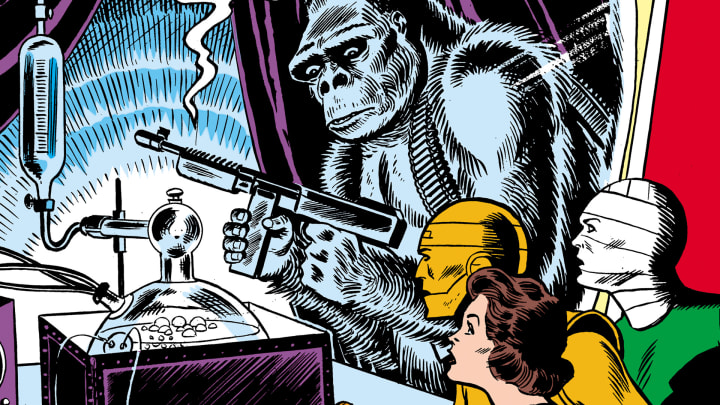
In the opening lines of the new DC Universe original, Doom Patrol, Mr. Nobody (an ever-charming Alan Tudyk) remarks, “Ugh. More TV superheroes. Just what the world needs.” Within seconds, Doom Patrol enlightens its viewer. Here is a programme that knows where it is at, and what the hell it is. Superhero television shows are the latest obsession. On ABC you will find Marvel’s Agents of SHIELD, on Netflix you will see Dark Horse’s The Umbrella Academy and on the CW, you would find an array of DC shows like Arrow, The Flash and Supergirl. None of which are particularly good, but that is another discussion entirely. Earlier this year, DC unveiled a new programme on their streaming service (DC Universe), Titans, and despite the fantastic castings, elaborate costume designs and overall maturity, the show feels dated, completely unaware and, for lack of a better word, lame. With the newly released Doom Patrol, DC has done something utterly courageous; they have completely reshaped the superhero genre.

The Doom Patrol meet The Brotherhood of Evil in 'Doom Patrol' #86
The Doom Patrol is one of the more obscure super-groups in the DC Comics library. Originally introduced in "My Greatest Adventure" #80 in 1963, the team has often been described as “DC’s X-Men.” However, it takes a simple Google search to discover that the Doom Patrol’s existence eclipsed Marvel’s Merry Mutants by just a few months. The similarities between the two groups (both teams are led by intelligent men in wheelchairs, as well as being shunned by their respective societies) led Doom Patrol creator, Arnold Drake to believe that Marvel—and more specifically Stan Lee—stole the idea. In an interview with Drake from 2005, the writer stated:
“Over the years I’ve became more and more convinced that [Stan Lee] knowingly stole The X-Men from The Doom Patrol … Over the years I learned that an awful lot of writers and artists were working surreptitiously between the two offices [Marvel and DC]. Therefore, from when I first brought the idea into the [DC editor] Murray Boltinoff’s office, it would’ve been easy for someone to walk over and hear that this guy Drake is working on a story about a bunch of reluctant superheroes who are led by a man in a wheelchair. So over the years I began to feel that Stan had more lead time than I realized. He may well have had four, five or even six months.”
Despite multiple cancellations, and never catching on like the X-Men, the Doom Patrol returned to the public eye back in 1988 with lauded writer Grant Morrison. The Scottish scribe took what was already a bizarre property and made it “weirder.” Morrison’s Doom Patrol dealt with themes like depression, anxiety and physical disabilities, all of which find their way into the TV adaptation.

Matt Bomer, Brendan Fraser, Diane Guerrero, April Bowlby and Jovian Wade in 'Doom Patrol'
On paper, a show like Doom Patrol would be a perfect fit for the DC contemporary audiences know (and occasionally love): a company well-established for their dark and gritty stories (so much so they are parodied in rival Marvel films like Deadpool 2). However, Doom Patrol is DC’s antithesis. Instead of rooting itself in utter misery—which it so easily could—the show finds a way to flip the gritty and gloomy tone on its head. The origin stories of the heroes in question are all immensely sad, for vastly different reasons. With Robotman, also known as Cliff Steele, we experience the character’s incredible downfall from hot shot racer to a depressed, sex addict.
Steele's addiction knows no limits, as our introduction to him shows the character having sex with his daughter’s nanny. Steele later finds himself in a crash which (of course), takes the lives of his wife and daughter, leaving him the sole survivor. However, Steele’s body is beyond repair, and Doctor Sivana (Timothy Dalton) places his still-functioning brain inside a robot suit.
In Rita Farr (April Bowlby), the audience meets a film star and casual racist. On set of her latest “picture,” Farr spots a camera operator who is a disabled black man. When she forces him off the shoot, much like Steele, karma has the last laugh. Her body morphs into a disgusting gelatinous creature. The show’s ironic genius does not stop there.
The only character who does not deserve the horrible fate that presents them is Larry Trainor, better known as Negative Man. Described as an “American God,” by Mr Nobody, Trainor was an Air Force pilot who becomes brutally scarred after a flight test went wrong. Interestingly, Trainor was hiding his sexuality from his wife, and society (an understandable decision back in 1960s America). These origins are all incredibly authentic to the comic book cliché. Much like Spider-Man’s initial selfish use of his powers, or Tony Stark’s ignorance for how his weapons benefit terrorists; once tragedy bestows these characters (Spider-Man’s Uncle Ben dies, and Stark's very own designs critically injure him) they rethink their approach to life, and become heroes. There is something oddly refreshing about seeing that once again in 2019 with Doom Patrol.

Brenton Thwaites as Robin in 'Titans'
What fascinates me the most about Doom Patrol is that it feels like a direct response to Titans, a show made by the same people. Where the latter is unbelievably edgy and over-the-top, Doom Patrol is not. Much like Titans, this show includes graphic sex scenes, intense violence and some down-right depressing sequences (including a great scene in which Brendan Fraser’s Robotman discovers that he is responsible for the death of his wife and child), but they are never cheesy or, as I previously said, lame. When a character like Crazy Jane (Diane Guerrero) swears or calls her father who uses a wheelchair a “little bitch,” it feels authentic and of that character. Compare that to the constantly swearing and sigh-inducing interpretation of Robin (Brenton Thwaites) from Titans. One fundamental positive from the first episode of Doom Patrol is that it is not dark for the sake of being dark. Tragic scenes are, indeed, portrayed as painful, however, the programme does not ever forget the lightness and charm of the original comic book. In Titans there is no humanity. Whether it is Negative Man’s (Matt Bomer) obsession with his garden or the touching and hopeful moments of humanity as seen in simple conversations between Crazy Jane and Robotman, Doom Patrol has a firm grasp on what makes a great human and soulful story. The fascinating part of this show is the sheer genuineness. Despite being bizarre people with extreme superpowers, at the end of the day, these people are just that: people.






Comments
There are no comments for this story
Be the first to respond and start the conversation.